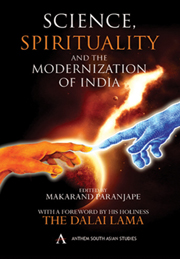Book contents
- Frontmatter
- Contents
- Notes on Contributors
- Foreword
- Editor's Preface
- I Science and Spirituality: East and West
- II Coming to Terms with Science: Some Change Agents
- III Building Bridges: Evolution, Consciousness and Healing
- IV Science and Spirituality: Culture, Society and Gender
- CHAPTER 13 Faith outside the Lab
- CHAPTER 14 The Calling of Practical Spirituality
CHAPTER 13 - Faith outside the Lab
from IV - Science and Spirituality: Culture, Society and Gender
Published online by Cambridge University Press: 05 March 2012
- Frontmatter
- Contents
- Notes on Contributors
- Foreword
- Editor's Preface
- I Science and Spirituality: East and West
- II Coming to Terms with Science: Some Change Agents
- III Building Bridges: Evolution, Consciousness and Healing
- IV Science and Spirituality: Culture, Society and Gender
- CHAPTER 13 Faith outside the Lab
- CHAPTER 14 The Calling of Practical Spirituality
Summary
The four hundred and fifty strong academic community in the Indian Institute of Technology, Kharagpur, one of the premier institutions of science and technology in the country, include some of India's leading scientists and technologists, who have won reputed national and international awards for excellence in their respective fields of specialization. In an institution that prides itself on its ‘pursuit of excellence’, and where almost every faculty can boast of a Young Scientist Award if not a Shanti Swaroop Bhatnagar, the honours, distinctions and accolades won by academics should hardly come as a surprise. A conspicuous inclination towards spirituality, often but not always interchangeable with religion, is the surprise element. A significant number of academics, both senior and junior, appear to be ‘spirituality-friendly’, though some might not wear the signs of their faith as visibly as others.
But scientists and technologists at the Indian Institute of Technology, Kharagpur demonstrate the dichotomy usually observed between scientific pursuit and religious or spiritual practice. The scientists' practice of the ‘rational–scientific’ method in their respective disciplines and fields of specialization appears to have nothing to do with their personal beliefs, in which they inevitably posit their faith in the ‘intuitive–spiritual’ (Randrup, 2002). The scientists and technologists seem to have resolved the contradiction between the two sub-systems through clearly compartmentalizing their personal and public lives. While functioning within the rational–scientific mode in their professional activities, they slip into the intuitive–spiritual robes of their chosen faiths in their personal lives with considerable facility.
- Type
- Chapter
- Information
- Science, Spirituality and the Modernisation of India , pp. 229 - 237Publisher: Anthem PressPrint publication year: 2009



